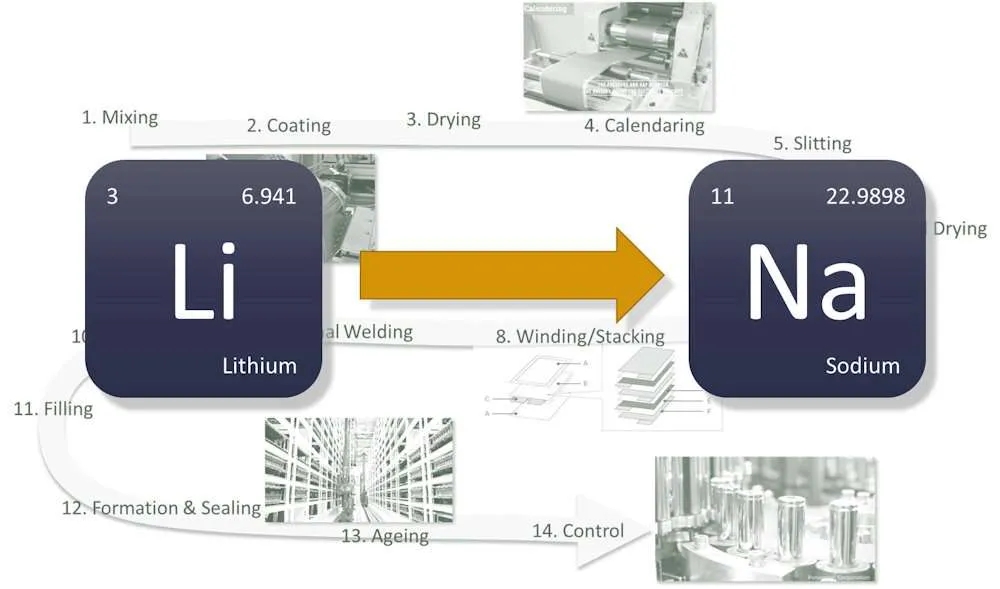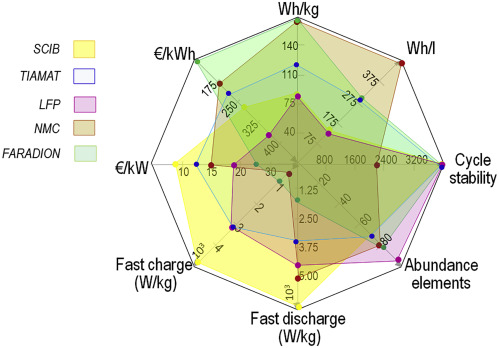メールを送信jubao@giantbao.com
メールを送信jubao@giantbao.com

世界中で電気自動車が普及し、エネルギー貯蔵需要が爆発的に増加する中、電池資源の不足が新たな問題となっています。「希少金属の代わりに塩を使う」という新しい電池のアイデアが、低コストと資源不足という根本的な問題を大きく解決できるのではないかと、ナトリウムイオン電池の登場に多くの人が期待を寄せています。
ナトリウムイオン電池には「十分な埋蔵量と手頃な価格」という利点があります。リチウムと比較して、ナトリウム資源は豊富で安価です。ナトリウム電池は「貴金属」を使用する必要がないため、コストは30%以上削減されます。上記のシンプルで簡潔な考え方からすると、ナトリウムイオン電池は電池の選択肢として選ばれ、将来の主要な開発方向となることは間違いないでしょう。
これほど優れた電池材料であるにもかかわらず、なぜナトリウムイオンは普及していないのでしょうか? 以下のように徹底的に比較します。
1. 類似点
リチウムイオン電池 ナトリウムイオン電池とリチウム電池は、動作原理と電池構造が同じです。化学的観点から見ると、ナトリウムとリチウムは周期表の同じ主族に属し、物理的・化学的性質が類似しています。そのため、両者の充放電プロセスは同じです。充電プロセスでは、正極材料から金属イオンが放出され、電解質とセパレーターを介して負極材料に埋め込まれ、電子は外部回路を介して正極から負極に流れます。放電プロセスは正極と負極の逆のプロセスです。同様に、電池構造の観点から見ると、どちらも正極、負極、セパレーター、電解質、集電体で構成されています。

2. 相違点
ナトリウム電池の利点は、コスト、低温性能、安全性に表れています。まず、電池材料のコストが低いです。地球はナトリウム資源が豊富で、元素含有量は約23,000ppm(リチウムはわずか17ppm)で、地殻の埋蔵量は2.64%にも達します。また、電池の正極液と負極液はどちらも安価なアルミ箔を使用できるため、量産コストはリチウムイオン電池に比べて約35%低くなります。第二に、低温環境での放電性能が優れています。-20℃では容量維持率が90%に近く、-40℃~80℃の温度範囲で正常に動作します。第三に、電池の安全性が高いです。穴あけ、押し出し、過充電、過放電などの電池安全性試験項目において、発火や爆発は発生しません。
ナトリウム電池の欠点はエネルギー密度に表れています。ナトリウムイオンの半径はリチウムイオンよりも大きく、単位体積あたりに含まれるイオンの数が少ないため、充放電時に移動できる電子の数が少なくなります。マクロ的に見ると、蓄電容量はリチウムイオン電池よりも低いです。現在、ナトリウム電池のエネルギー密度は90~160Wh/kgの範囲にあり、理論上の航続距離は400キロメートルを超えず、リチウム電池の航続距離を大きく下回っています。これはナトリウム電池の大きな欠点であり、ほとんどの新エネルギー車のニーズを満たすことができず、市場をリチウム電池に譲るしかありません。

3. 結論
一般的に、ナトリウム電池とリチウム電池はそれぞれ長所と短所があり、それぞれ得意分野を持っています。ナトリウム電池はコスト、低温性能、安全性の面でより競争力があります。現在、産業化の初期段階にあるものの、潜在的な市場は巨大です。応用シナリオが拡大するにつれて、ナトリウム電池は最終的に「際立つ」存在となるでしょう。

ぜひ読んで、最新情報を入手し、購読してください。ご意見をお聞かせください。
著作権 @ 2025 Hefei Jubao New Energy Technology Co., Ltd. 無断転載を禁じます.
 ネットワークサポート
ネットワークサポート
サイトマップ /Xml /Blog /プライバシーポリシー